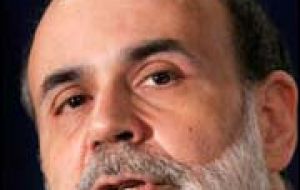MercoPress. South Atlantic News Agency
Bernanke anticipates “noticeably” slow growth ahead
 Fed Reserve CEO Ben Bernanke
Fed Reserve CEO Ben Bernanke Federal Reserve Chairman Ben Bernanke said that a host of economic problems in United States, including the severe housing slump, will cause business growth to slow noticeably in coming months.
Bernanke told Congress' Joint Economic Committee that the Fed is watching developments closely, but gave no signal that it is prepared at the current time to cut interest rates even further. He stressed that the Fed was keeping all options open, saying the bank would be closely watching economic growth and the threat of inflation. If the economy slows to a crawl, the Fed cuts rates to boost activity while if inflation becomes a threat, it raises interest rates to dampen price pressures. Going forward, Bernanke said the Fed would not be "dogmatic" in what it might do. "We will try to make judgments over time as we get more information," Bernanke said, adding at another point that there were a "lot of uncertainties" at present. Fed policymakers last week cut a key interest rate for the second time in two months, but disappointed Wall Street by discouraging expectations that it would follow with further rate cuts. Bernanke said he and his colleagues believe economic activity will "slow noticeably in the fourth quarter" compared to the 3.9% pace of the third quarter. "Growth was seen as remaining sluggish during the first part of next year, and then strengthening as the effects of tighter credit and the housing correction begin to wane," Bernanke told the JEC. Many economists believe the US economy's maximum point of danger of falling into a recession will occur in the early part of next year. A variety of problems from the steepest housing downturn in more than two decades to a severe credit crunch, surging oil prices and a falling dollar have roiled Wall Street in recent days, triggering big plunges in stock prices. Bernanke acknowledged the recent market turmoil, but he generally took a more upbeat view of things, saying the Fed believes the economy should rebound from the current problems by the second half of next year. He also repeated worries the Fed expressed last week: recent increases in oil and other commodities could raise the threat of inflation. The Fed last week said the threats from weak growth and higher inflation seemed roughly in balance. Such a view, which Bernanke repeated will likely mean that the central bank plans no further interest rate cuts. "All told, it was the judgment of (Fed policymakers) that, after its action on Oct. 31, the stance of monetary policy roughly balanced the upside risks to inflation and the downside risk to growth," Bernanke said. However, members of the congressional panel said they believed a much more aggressive response was needed. "I think we are at a moment of economic crisis," Sen. Charles Schumer told Bernanke. "I am not surprised to hear experts such as your predecessor, Alan Greenspan, warn about the threat of a recession. I have begun to worry about it to." The steep slump in housing has been worsened by rising numbers of mortgage foreclosures as borrowers are unable to meet higher payments as their initial low "teaser" rates reset. Bernanke said that on average about 450.000 subprime mortgages will reset to higher rates each quarter through the end of next year. Bernanke said the number of foreclosures that will result from these resets can be reduced if financial institutions work with borrowers.




Top Comments
Disclaimer & comment rulesCommenting for this story is now closed.
If you have a Facebook account, become a fan and comment on our Facebook Page!